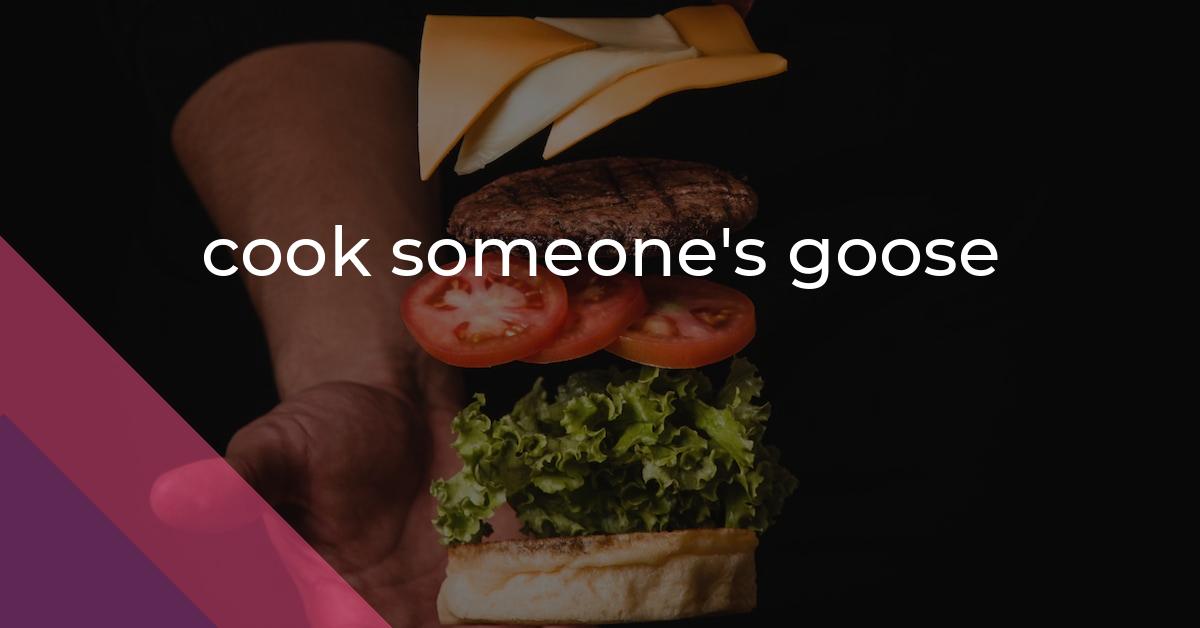cook someone’s goose: Idiom Meaning and Origin
What does ‘cook someone's goose’ mean?
The idiom "cook someone's goose" means to ruin someone's plans or cause their downfall.

Idiom Explorer
The idiom "spoil someone rotten" means to excessively pamper or indulge someone, often resulting in them becoming spoiled or having a sense of entitlement.
The idiom "goose is cooked" means that a person or situation is in a dire or hopeless position, with no chance of escape or success.
"Cook up a storm" means to prepare food passionately and with great skill, resulting in a delicious and satisfying meal.
The idiom "cook the books" means to manipulate financial records dishonestly in order to mislead or deceive others, typically for personal gain or to show false success.
The idiom "come to grief" means to experience a failure or a bad outcome, often as a result of one's own actions or decisions.
The idiom *come home to roost* means that the negative consequences of one's actions will eventually catch up with them.
The idiom "cock one's toes" means to die or be killed.
"Clip someone's wings" is an idiom that means to curtail someone's freedom, aspirations, or abilities in order to bring them under control or limit their potential.
The idiom "choke off" means to stop or prevent something from continuing or progressing.
Chickenize: To make someone or something cowardly or weak, similar to how a chicken may be timid or easily frightened.
Geese and Revenge
A widely used idiom, "cook someone's goose" has been an integral part of the English language for several centuries. It refers to the act of ruining someone's plans by outsmarting or defeating them. The idiom "cook someone's goose" evolved from the practice of cooking geese during the Middle Ages. Back then, geese were a common delicacy and cooking one required skill and precision. Cooking a goose would often take a considerable amount of time and effort, making it a symbol of a valuable possession or even a special occasion meal.
This idiom is often used to describe situations where someone's hopes or expectations are dashed. It may imply a sense of retribution or comeuppance, suggesting that the individual being targeted had it coming or deserved the negative outcome. The idiom's usage has remained prevalent throughout the years, with its inclusion in modern English dictionaries further attesting to its widespread usage and recognition.
While the idiom "cook someone's goose" has a clear meaning, its usage still allows for some ambiguity, offering creative possibilities for interpretation and application. Its timeless nature allows it to adapt to various situations, making it a versatile and enduring phrase in the English language.
The idiom "goose is cooked" is closely related to "cook someone's goose." Both idioms share the common theme of ruining someone's plans. "Goose is cooked" is often used to describe a situation where someone is in a difficult or challenging predicament that cannot be resolved. It implies that the person's plans or schemes have been completely thwarted, leaving them with no way out. This idiom adds a sense of finality to the situation, indicating that there is no solution or escape.
The idiom "spoil someone rotten" is also related to "cook someone's goose." While "cook someone's goose" focuses on ruining someone's plans, "spoil someone rotten" emphasizes the act of showering someone with excessive love, attention, or indulgence to the point of detriment. The idiom suggests that when someone is spoiled rotten, they become accustomed to having their desires fulfilled without any effort or consequences. In essence, their plans or ambitions may be spoiled by their own pampered and entitled behavior.
Both idioms, "goose is cooked" and "spoil someone rotten," share a common thread with "cook someone's goose" in that they describe different aspects of ruining someone's plans or circumstances. While "cook someone's goose" represents the act of outsmarting or defeating someone, "goose is cooked" signifies a hopeless or dire situation where there is no way out. Alternatively, "spoil someone rotten" portrays the consequences of excessive indulgence and lack of self-discipline.
Overall, "cook someone's goose" is an enduring idiom with a rich historical connection to cooking geese. It has remained prevalent in the English language due to its flexible and adaptable nature. Whether you encounter a situation where someone's plans are foiled or you witness someone reaping the consequences of their entitled behavior, these idioms offer a colorful and concise way to express these scenarios.
Example usage
Examples of how the idiom "cook someone's goose" can be used in a sentence:
- He spread rumors about his colleague, which ultimately cooked his goose in the workplace.
- The detective uncovered enough evidence to cook the suspect's goose and ensure a conviction.
- She was caught cheating on the exam, which really cooked her goose with the professor.
More "idiom" idioms



